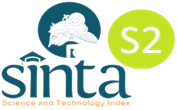Evaluation and Inhibition Test of Mango Leaf Extract Paper Soap (Mangifera indica L) to Growth of Pseudomonas aeruginosa and Candida albicans
DOI:
https://doi.org/10.33477/bs.v14i2.9316Abstract
In this study, mango extract was formulated with varying concentrations of paper soap. Assessment of paper soap includes testing organoleptic type, pH value, foam height, and water content. The purpose of the study was to assess and test paper soap formulations containing mango leaf extract (Mangifera indica L.) in inhibiting the growth of Pseudomonas aeruginosa and Candida albicans. Mango leaves are known to have active connections that may be antiseptic. The inhibition test was performed by the pitting diffusion method. The diameter of the inhibition zone formed around the wells was measured after incubation using a ruler. The results showed that the formulation of mango leaf extract has excellent physical properties and does not cause irritation to the skin at certain concentrations and formulations. Inhibition tests show that soap from mango leaf extract is not effective for inhibiting the growth of Pseudomonas aeruginosa, but can inhibit the growth of Candida albicans with an increase in the inhibition zone as well as an increase in extract concentration with a weak category. Mango leaf extract paper soap cannot be an antiseptic soap on Pseudomonas aeruginosa but can be an antiseptic on Candida albicans.
Keywords: Antiseptic, Candida albicans, Pseudomonas aeruginosa
Downloads
Published
Issue
Section
License

This work is licensed under a Creative Commons Attribution-NonCommercial 4.0 International License.
Authors who publish with this journal agree to the following terms: Authors retain copyright and grant the journal right of first publication with the work simultaneously licensed under a Creative Commons Attribution License that allows others to share the work with an acknowledgement of the work's authorship and initial publication in this journal. Authors are able to enter into separate, additional contractual arrangements for the non-exclusive distribution of the journal's published version of the work (e.g., post it to an institutional repository or publish it in a book), with an acknowledgement of its initial publication in this journal. Authors are permitted and encouraged to post their work online (e.g., in institutional repositories or on their website) prior to and during the submission process, as it can lead to productive exchanges, as well as earlier and greater citation of published work.














